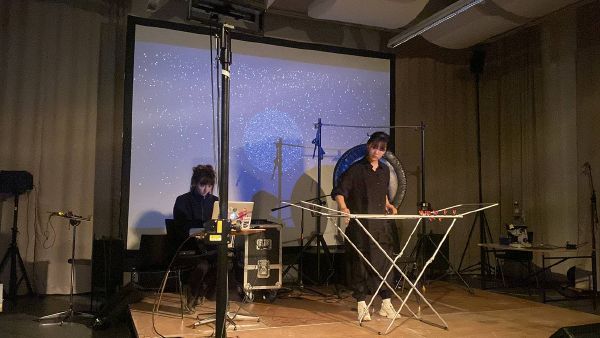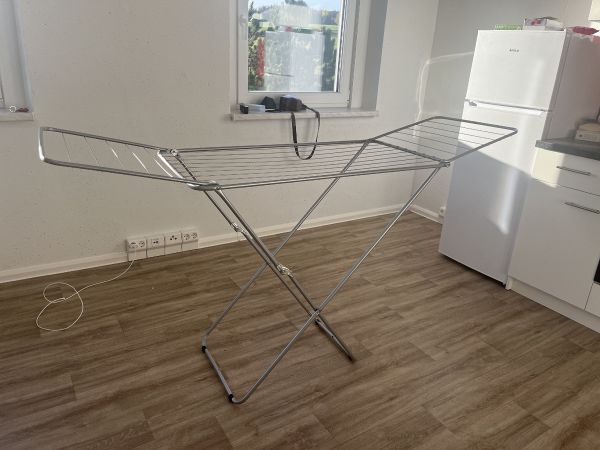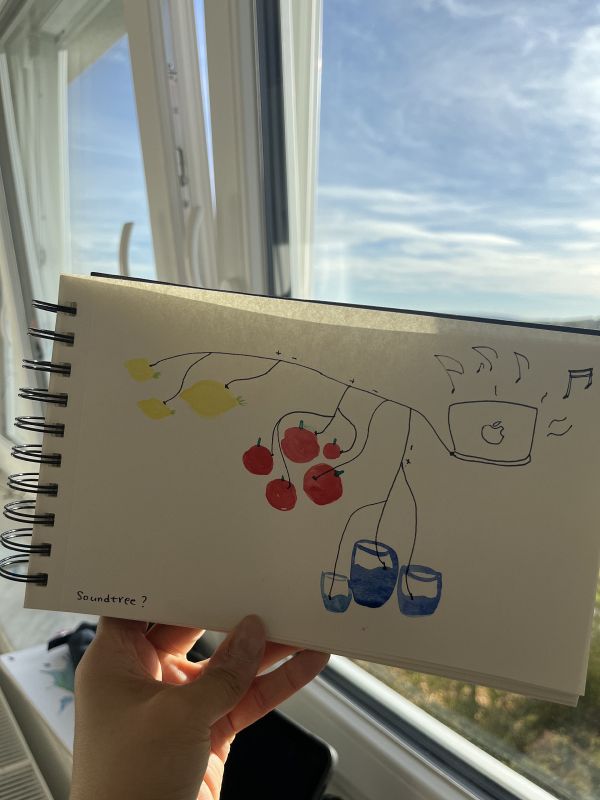No edit summary |
(→Vibra) |
||
| (33 intermediate revisions by 2 users not shown) | |||
| Line 1: | Line 1: | ||
== Vibra == | |||
[[File:photo_2023-02-14_14-44-46.jpg|600px]] | |||
[[File:play1.MOV||600px]] | |||
As we experimented the Lemon battery, the electric current could also be produced by, for example, potatoes, or humans | What do we think and expect from this object, Drying rack? | ||
For someone, this laundry drying rack is a household tool for 'living', and it is the object that has an inherent folding and unfolding movement. Using this object as the main material, this art piece changes the approach to the object by making an unexpected sound. By amplifying and playing the sound of this object, which was used as a common tool in everyday life, it gives variations in the way of viewing objects. When this object is used as a tool for other activities, rather than a routine role of hanging and drying clothes, should it really fall into the category of laundry drying? | |||
The concept of the simulacrum from Gilles Deleuze is used as a principle of this work. | |||
===The concept of the simulacrum=== | |||
The Deleuzian concept of the simulacrum can be defined in terms of three characteristics, which stand in contradistinction to the three components of the Platonic Idea summarized above.. | |||
from page 12 you can find a document about the simulacrum from Gilles Deleuze | |||
https://philarchive.org/archive/SMITCO-5 | |||
DW Smith · 2005 | |||
''This article examines Gilles Deleuze’s concept of the simulacrum, which Deleuze formulated in the context of his reading of Nietzsche’s project of “overturning Platonism.” The essential Platonic distinction, Deleuze argues, is more profound than the speculative distinction between model and copy, original and image. The deeper, practical distinction moves between two kinds of images or eidolon, for which the Platonic Idea is meant to provide a concrete criterion of selection “Copies” or icons (eikones) are well-grounded claimants to the transcendent Idea, authenticated by their internal resemblance to the Idea, whereas “simulacra” (phantasmata) are like false claimants, built on a dissimilarity and implying an essential perversion or deviation from the Idea. If the goal of Platonism is the triumph of icons over simulacra, the inversion of Platonism would entail an affirmation of the simulacrum as such, which must thus be given its own concept. Deleuze consequently defines the simulacrum in terms of an internal dissimilitude or “disparateness,” which in turn implies a new conception of Ideas, no longer as self-identical qualities (the auto kath’hauto), but rather as constituting a pure concept of difference. An inverted Platonism would necessarily be based on a purely immanent and differential conception of Ideas. Starting from this new conception of the Idea, Deleuze proposes to take up the Platonic project anew, rethinking the fundamental figures of Platonism (selection, repetition, ungrounding, the question-problem complex) on a purely differential basis. In this sense, Deleuze’s inverted Platonism can at the same time be seen as a rejuvenated Platonism and even a completed Platonism.'' | |||
source : https://link.springer.com/article/10.1007/s11007-006-3305-8 | |||
==Process== | |||
=== Ideas === | |||
As we experimented the Lemon battery, the electric current could also be produced by, for example, potatoes, or humans. Supposedly each object has a different volume of electricity. When I can auditoryize different currents, it could be played like instruments. | |||
In additional, I'm also curious about friction. If an object is frictioned by an impact, does an electric current occur then? Or does it change from the current it originally had? For example, when I hit an iron hanger on an iron laundry dryer(clothes dryer), friction occurs, and will electricity be generated? | In additional, I'm also curious about friction. If an object is frictioned by an impact, does an electric current occur then? Or does it change from the current it originally had? For example, when I hit an iron hanger on an iron laundry dryer(clothes dryer), friction occurs, and will electricity be generated? | ||
[[File:clothes_dryger.jpeg]] | [[File:clothes_dryger.jpeg|600px]] | ||
[[File:sketch_0811.jpeg|600px]] | |||
===Sound test=== | |||
[[File:sound_test.mp4]] | [[File:sound_test.mp4]] | ||
===A test with the piezo microphone === | |||
10.12.2022 | |||
{{#ev:youtube|t_fpvrnxf4o|600}} | |||
i took this video by using my DSLR to record my performance and iPhone to record the sound. I put the iPhone just next to the computer. and at the same time i used able-ton for sound... I edited this video with Final Cut X to combine the sound and video. | |||
Personally I think there is a lot of problems. even it is really horrible to just listen to it. | |||
It is too noisy and sounds really somehow dirty. and my DIY piezo microphone is too large for strings on the clothe dryer. | |||
How can I make the sound more clear? | |||
** Why did I choose the CLOTHE DRYER for my material? | |||
It was kinda interesting when i brought the video of my test with clothe dryer, some people said "oh! you took a video with a harp!" and i answered, "No, i played piano in my video.". | |||
This moment let me think about skeletons of objects. Through the skeletons we guess the objects or shapes of the objects. | |||
In a good way, i can define the possibility of beings with it. | |||
But in a more complicated way, simulacrum from Deleuze and idea from platon. | |||
===new sound test=== | |||
18.12.2022 | |||
[[:File:1218sound.wav]] | |||
===thoughts on sustainability in aesthetics=== | |||
it could be a solution or art which is green and more eco friendly. to be ... | it could be a solution or art which is green and more eco friendly. to be ... | ||
| Line 25: | Line 72: | ||
When it comes to sustainability in aesthetics, the final artwork should be eco-friendly and green which means it will be proper when we work with recycled stuff or nature-resource. Either the solution of the works could be for future. | When it comes to sustainability in aesthetics, the final artwork should be eco-friendly and green which means it will be proper when we work with recycled stuff or nature-resource. Either the solution of the works could be for future. | ||
== | ===Further experiments=== | ||
[[Experiments]] | *[[Experiments]] | ||
==References== | ==References== | ||
===Marzelline’s Confessions=== | |||
By Jocelyn Ho | |||
Domestic tools to become new musical instruments | |||
* https://isea2022.isea-international.org/event/performance-womens-labor-embedded-iron/ | |||
===Prototype 432=== | ===Prototype 432=== | ||
Bernardas Bagdanavicius | Bernardas Bagdanavicius | ||
Latest revision as of 07:14, 15 March 2023
Vibra
What do we think and expect from this object, Drying rack?
For someone, this laundry drying rack is a household tool for 'living', and it is the object that has an inherent folding and unfolding movement. Using this object as the main material, this art piece changes the approach to the object by making an unexpected sound. By amplifying and playing the sound of this object, which was used as a common tool in everyday life, it gives variations in the way of viewing objects. When this object is used as a tool for other activities, rather than a routine role of hanging and drying clothes, should it really fall into the category of laundry drying?
The concept of the simulacrum from Gilles Deleuze is used as a principle of this work.
The concept of the simulacrum
The Deleuzian concept of the simulacrum can be defined in terms of three characteristics, which stand in contradistinction to the three components of the Platonic Idea summarized above..
from page 12 you can find a document about the simulacrum from Gilles Deleuze https://philarchive.org/archive/SMITCO-5
DW Smith · 2005
This article examines Gilles Deleuze’s concept of the simulacrum, which Deleuze formulated in the context of his reading of Nietzsche’s project of “overturning Platonism.” The essential Platonic distinction, Deleuze argues, is more profound than the speculative distinction between model and copy, original and image. The deeper, practical distinction moves between two kinds of images or eidolon, for which the Platonic Idea is meant to provide a concrete criterion of selection “Copies” or icons (eikones) are well-grounded claimants to the transcendent Idea, authenticated by their internal resemblance to the Idea, whereas “simulacra” (phantasmata) are like false claimants, built on a dissimilarity and implying an essential perversion or deviation from the Idea. If the goal of Platonism is the triumph of icons over simulacra, the inversion of Platonism would entail an affirmation of the simulacrum as such, which must thus be given its own concept. Deleuze consequently defines the simulacrum in terms of an internal dissimilitude or “disparateness,” which in turn implies a new conception of Ideas, no longer as self-identical qualities (the auto kath’hauto), but rather as constituting a pure concept of difference. An inverted Platonism would necessarily be based on a purely immanent and differential conception of Ideas. Starting from this new conception of the Idea, Deleuze proposes to take up the Platonic project anew, rethinking the fundamental figures of Platonism (selection, repetition, ungrounding, the question-problem complex) on a purely differential basis. In this sense, Deleuze’s inverted Platonism can at the same time be seen as a rejuvenated Platonism and even a completed Platonism.
source : https://link.springer.com/article/10.1007/s11007-006-3305-8
Process
Ideas
As we experimented the Lemon battery, the electric current could also be produced by, for example, potatoes, or humans. Supposedly each object has a different volume of electricity. When I can auditoryize different currents, it could be played like instruments.
In additional, I'm also curious about friction. If an object is frictioned by an impact, does an electric current occur then? Or does it change from the current it originally had? For example, when I hit an iron hanger on an iron laundry dryer(clothes dryer), friction occurs, and will electricity be generated?
Sound test
A test with the piezo microphone
10.12.2022
i took this video by using my DSLR to record my performance and iPhone to record the sound. I put the iPhone just next to the computer. and at the same time i used able-ton for sound... I edited this video with Final Cut X to combine the sound and video.
Personally I think there is a lot of problems. even it is really horrible to just listen to it. It is too noisy and sounds really somehow dirty. and my DIY piezo microphone is too large for strings on the clothe dryer. How can I make the sound more clear?
- Why did I choose the CLOTHE DRYER for my material?
It was kinda interesting when i brought the video of my test with clothe dryer, some people said "oh! you took a video with a harp!" and i answered, "No, i played piano in my video.". This moment let me think about skeletons of objects. Through the skeletons we guess the objects or shapes of the objects. In a good way, i can define the possibility of beings with it. But in a more complicated way, simulacrum from Deleuze and idea from platon.
new sound test
18.12.2022
thoughts on sustainability in aesthetics
it could be a solution or art which is green and more eco friendly. to be ...
For me, the definition of aesthetics has a wide range of diversity. Sometimes it should be visually aesthetic. On the other hand, it could look ugly, but the content can be aesthetic. The point is harmony and symmetry of itself.
When it comes to sustainability in aesthetics, the final artwork should be eco-friendly and green which means it will be proper when we work with recycled stuff or nature-resource. Either the solution of the works could be for future.
Further experiments
References
Marzelline’s Confessions
By Jocelyn Ho
Domestic tools to become new musical instruments
Prototype 432
Bernardas Bagdanavicius
"The prototype is constructed of steel elements united in a three dimensional matrix structure. Electric guitar steel strings are incorporated into machined heads attached to the steel frame. All 432 strings are crossed and spaced at regular intervals and each of them is has a contact microphone connected to the sound system and operated by computer. It is a closed circuit energy generator for the sound object."
Thomas Saraceno
Aeolin harp
Theremin
simple way to make a theremin


